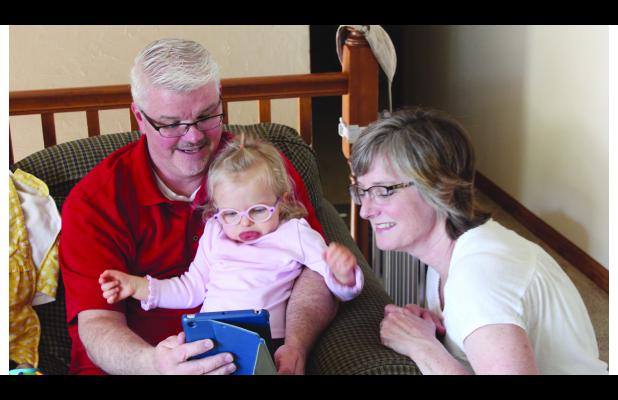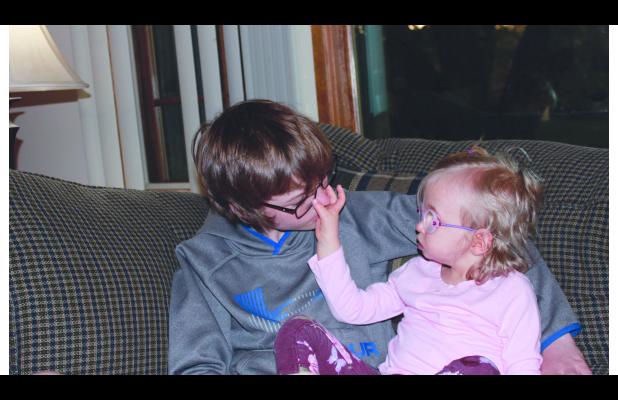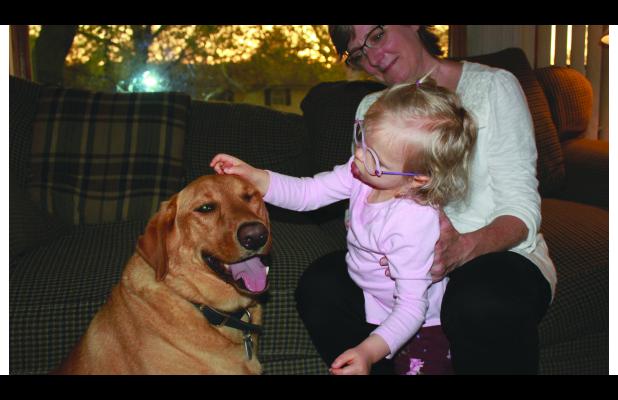
Evy Harsh, held by her father Kris, uses Apple’s FaceTime app to connect with her sisters Allison and Natalie as her mother Anne looks on at their home last spring. ERIN KELLER
News
Little Girl’s Suffering Leads Family, Others To God
October 31, 2019
- Evy plays with her brother Nathan in the Harsh family living room this past summer. KRIS HARSH
- Anne Harsh supports Evy as she stands in their living room and pets their dog Rex on a summer evening. KRIS HARSH
Something was wrong.
Anne Harsh had just given birth to a beautiful baby girl at Methodist Hospital in Omaha. Evy was the Harshes’ fifth child, born on Christmas Eve, 2013.
Suddenly five nurses rushed into the room, swarming around her. They wanted a better look at Evy. Something was not right. Anne’s husband, Kris, knew it, and she knew it.
That their baby might have a problem came as a bit of a surprise. Kris and Anne, both 47 at the time, had opted against the triple screen blood test to identify possible birth defects. However, two ultrasounds during pregnancy showed no complications.
The nurses’ behavior prompted Anne to take a closer look.
“While I watched her laying in the bassinet, within 20 minutes I thought she had Down Syndrome,” she said. “She had those almond-shaped eyes and she was thrusting her tongue out.”
Many people think kids with severe birth defects and developmental disabilities – such as Down Syndrome – are just burdens. Often these pregnancies end in abortion. Yet the Harsh family – Kris, Anne and their older children Allison, Claire, Natalie, and Nathan – have found that Evy is a tremendous joy,
even if she has led them on an unanticipated journey.
Laying in the hospital looking at Evy, I was so in love with her. One thing I really remember feeling strongly about was how happy I was that we did not find out while I was pregnant, because the unknown is always scarier,” said Anne Harsh. “But once you are looking at that child and holding her, all you can say is, ‘It’s okay, honey, I love you.’
CHRISTMAS JOY
Though full-term, Evy presented as premature at birth, as she was still covered in vernix, a thick, white coating on her skin. She had a large soft spot on the top of her head. She was also developmentally delayed, even for a newborn.
A pediatrician who arrived in the room confirmed Anne’s suspicion: He thought Evy had Down Syndrome. He asked for permission to test the umbilical cord.
“Laying in the hospital looking at Evy, I was so in love with her,” Anne said. “One thing I really remember feeling strongly about was how happy I was that we did not find out while I was pregnant, because the unknown is always scarier. … But once you are looking at that child and holding her, all you can say is, ‘It’s okay, honey, I love you.’”
In the early hours of Christmas morning, as things quieted, Anne pondered how so many people say Down Syndrome children bring their families such joy. So at 3 a.m. on Christmas morning, Evy’s middle name became Joy.
Even thinking Evy had Down Syndrome, the Harshes were resolute.
“I give a lot of credit to friends of ours whose sixth child has Down Syndrome and they are the most beautiful witness to just carrying on with life,” Anne said. “They didn’t skip a beat with the birth of their beautiful daughter. So we had no fear of having a child with Down Syndrome.”
TIP OF THE ICEBERG
Two days after coming home from the hospital, Kris and Anne took Evy to the pediatrician for a routine postpartum checkup. A test revealed that Evy did not have Down Syndrome; rather, something was amiss with her 18th chromosome. But the doctor said it was unknown if it would have any impact on Evy’s life.
It took a month to get a better picture. Further testing showed a large duplication of the 18th chromosome, and the condition would have a significant impact. The doctor told them he wanted them to go to the Munroe-Meyer Institute in Omaha for a full consultation.
At their mid-January appointment, Kris and Anne learned that Evy had partial trisomy 18. That occurs when part of a third or extra chromosome attaches to the 18th chromosome in every cell of the body, affecting every major organ and system. The Harshes were handed an extensive list of other illnesses to which partial trisomy 18 babies were susceptible.
THE TRUTH SINKS IN
Natalie Harsh, now a 20-year old college sophomore, remembers flipping through the pages listing the diseases Evy might get.
“At that point, I kinda realized, this is a lot more than I thought,” she said.
The family also learned that “most authorities consider trisomy 18 to be a fatal, congenital disorder with a mean survival of 1-3 months. Only 10% survive past one year” (Van Dyke and Allen 1990).
Evy’s first 12 months were filled with checkups and ultrasounds. She wore a body brace to realign her hips, and also dealt with constant intestinal issues. She persisted, however, and at 12 months was able to pull herself up to a standing position next to the living room couch.
But at 13 months, the family noticed slight tremors in Evy’s body. Within a month an electroencephalogram (EEG) led to a diagnosis of infantile spasms, a form of epilepsy that causes chaos in the developing brain. To calm the spasms, she was prescribed a medicine that needed to be administered through a gastrostomy tube (G-tube) in her abdomen.
By the summer of 2015, the seizures and seizure medicine weakened Evy to the point that she could no longer nurse or swallow food, requiring 90% of her nutrition to be provided through the G-tube.
FAMILY OF FAITH
Jesuit Father Andy Alexander is the director of the Collaborative Ministry Office at Creighton University in Omaha, as well as a weekend Mass celebrant at St. Robert Bellarmine Parish in Omaha, where the Harshes are members. He believes God entrusted the Harsh family – which was already a family of faith – with the grace of receiving Evy.
He said he has watched the Harsh family loving Evy with “an extraordinary love.”
“Anne would hate it if I described her as a saint, but I know I can say with real confidence that Evy is making Anne and their entire family quite holy,” he said.
Since Evy’s arrival, the Harshes’ selfless care and desire to suffer alongside her have inspired faith and awe in those around them, including himself, Father Alexander said.
“Every time I have Mass there (St. Robert’s) and Kris or Anne is carrying Evy up to communion, I reach out to bless her and she turns around and just looks at me with those big blue eyes of hers, I know she is surrounded by Jesus’ embrace,” he said.
LIKE A ROLLER COASTER
Kris is grateful Evy is not affected by heart issues common to her condition. However, she deals not only with epilepsy but low muscle tone, leaving her unable to communicate verbally or walk. Because she needs so much care, life at their home “feels like a roller coaster,” he said.
But Kris also sees how Evy’s condition has made their family stronger. Best friends for seven years before marriage, Kris and Anne now work as a team more than ever.
Because of the financial burden associated with Evy’s care, both had jobs until last July, when Anne quit to focus exclusively on the family. And now that the older three girls are in college, or working full time, Kris and Anne have coordinated their schedules so that one parent is always home with Evy.
“We don’t take many things for granted that we used to,” Kris said. “Our whole family sees the importance of helping each other.”
Father Alexander has witnessed the graces the family has received through their travails.
“They have loved her with an extraordinary love and suffered greatly with every seizure she has endured,” he said.
LEANING ON GOD
At 16 months, Evy had her first grand mal seizure, as well as her first hospitalization.
“That is when the bottom dropped out and everything went haywire,” Anne said.
When Evy experiences a grand mal seizure, her whole body tenses and she becomes frozen stiff. Her breathing stops, and she frequently turns blue. When her body begins to shake, she might start breathing, or she may take a quick breath and hold it again.
“I am asking God during every grand mal to give her breath,” Anne said.
“There is a fear with every grand mal that this might be the one that takes her,” Kris added.
Anne recalled that first visit to the emergency room.
“The worst part is watching your little baby being on this table in the ER, with people working on her in a way that it is obviously an emergency,” she said. “I thought she was going to die. At that moment, I didn’t care if I looked silly; I took the medal of St. Charbel out and touched her with it.”
(St. Charbel Makhlouf was a Maronite priest and monk who lived in the mountains of Lebanon in the 19th century and was known for his holiness and miraculous healings.)
REDEMPTIVE SUFFERING
Evy’s needs and those of other family members spurred their other daughters to action. While Allison, now 23, was away at college, Natalie dove into helping her parents with Evy. She would feed her and administer her medications through the G-tube. Natalie helped Evy through her seizures and spent lots of time holding her.
Clare, now 21, spent time with Nathan, now 13, attempting to provide stability for her little brother as everyone’s days by then seemed to revolve around Evy.
Since that first hospital stay, Evy has endured five surgeries, 10 hospital stays, countless treatment-resistant seizures and side effects from medicines that at times seemed worse than the seizures themselves.
After the first three regimens of medicine, each of which lasted at least four weeks, Evy didn’t want to be touched or held. She would become upset when carried because it would cause her dizziness and nausea.
“If we went to pick her up she would cringe to be moved,” said Kris.
Since Evy did not respond to treatment, as a toddler she was diagnosed with Lennox Gastaut Epilepsy, which is generally treatment-resistant and has a specific EEG pattern. It is the most severe form of epilepsy.
FLICKER OF HOPE
In January 2018, after much consultation and prayer, doctors implanted in Evy’s body a Vagal Nerve Stimulator (VNS), similar to a pacemaker. Wires go up from a small generator through her neck to her vagal nerve, which runs from the brain through the face and thorax to the abdomen. Doctors hoped impulses from the VNS would calm the seizures.
“We know this is having a huge impact in quality of life for her. Since the VNS was put in, when Evy has a seizure, we swipe a magnet over her VNS, which interrupts the seizure, and sometimes stops the seizure completely,” Kris said.
Family members know the locations of the magnets in the house, as well as in the backpack when they’re on family trips. When a seizure begins, one person stays with Evy and another grabs a magnet and gently swipes it over the VNS.
“It has been so hard because not only is Evy experiencing the physical suffering of going through a seizure, she also experiences the frustration,” Anne said. “She knows she can pull herself up to stand. She will go to the couch to try, but if she is weak from a particular seizure medication, she can’t do it.
“There have been mornings when I wonder, ‘How can I get up just to watch my daughter suffer all day?’”
Father Alexander emphasized the beauty that comes when a family allows intense love to mingle with intense suffering.
“They care for her with hope that is dashed so frequently,” he said. “This involves deep suffering for those who love her and want her to experience joy and peace. When you mix that kind of suffering with love something really beautiful happens.”
At night, Evy sleeps in a crib next to her parents’ bed. While she sleeps, they monitor her heart rate and oxygen. When her heart begins to beat too fast, or her oxygen level drops too low, the monitor will alert them.
“The monitors are set to go off after the heart rate or oxygen stays at a certain level for eight seconds,” Anne said. “When she has a seizure at night, I have never been awakened by the monitor. There is a certain squeak I hear on her mattress or a way her breathing sounds. I know it, and I will awake out of a dead sleep. My brain is always listening for those sounds.”
JOY IN SUFFERING
There are times of great joy when Evy interacts and plays with her parents and siblings. She loves music, butterflies, her dog Rex, having her neck kissed and being outdoors. The family even planted a butterfly garden in the yard for her to enjoy.
Though Evy’s condition causes great suffering for her and those who love her, it also presents constant opportunities for family members to choose to love and work together for each other’s good. Anne frequently reminds people that they are far from being saints as life at their house gets messy.
“It is in the battle where the holiness comes,” she said, adding that when they are shaken, they’re not afraid to bring it to Jesus.
“Our culture encourages us to always ‘have it together.’ I don’t want people to think we have it together and are super holy people, because we don’t and we aren’t.”
Evy’s influence has extended beyond the walls of the Harsh home. Anne’s friend, Denise Boyd, her husband Jeff and their children pray for Evy daily. Their 11-year-old son Sean is sad when he hears she is not doing well and he is moved to pray for her. Through praying for Evy, his 8-year-old sister Ashley has learned that “God heals people.”
Hope Fett is a close family friend and former classmate of Natalie.
“Even though she is nonverbal, she knows who her sisters are and she knows who I am. She knows all the people who come into her life, she just can’t talk to them,” she said of Evy.
Fett recalls times when Natalie would help care for Evy instead of going out with friends.
“My respect for Natalie has completely grown because of how she loves and takes care of her sister,” she said. “I never had that kind of responsibility in high school.”
CHALLENGED TO GROW
Though some might see that as a burden, Natalie and her two sisters, Allison and Clare, disagree.
“She is our sister and we love her. We want to take care of her,” Allison said.
Nathan, an energetic teenager, is gentle with his little sister. He knows how to help during seizures and is stepping into a more active role in assisting his parents.
“His deepest gift is that he accepts everyone as they are,” Anne said. “I think Evy taught him that.”
All three of Evy’s sisters recognize that she has challenged them to grow in different ways.
“I am definitely a lot more responsible and less self-focused,” Claire said. “I think my perspective on life has changed in the sense that I now realize what is important and what is not.”
Claire believes Evy has opened her heart: “It is just impossible not to love her.”
DIVINE RESPONSE
Anne is convinced God did not cause Evy to have partial trisomy 18, even though he allows it.
“However, because he knew I would have this massive test of my faith, he began to build my faith for that event,” she said. “God preps you for whatever is coming your way.”
All the Harshes have experienced doubt due to the suffering they witness.
“I have definitely had times where I wonder how there could be a God who would allow Evy to suffer so much,” admitted Claire through tears.
“Ugly stuff goes through your mind: Are we not holy enough? Are our sins so bad that we have to walk through this? We must not be praying right,” Anne said.
“A lot of that came before I realized, ‘No, this just happened because it happened, but God knew it was going to and shored us up for this.’”
Kris believes that love born of suffering is a gift.
“Through suffering and sacrifice you learn to appreciate other things, you learn to appreciate each other, and you understand that life is not easy and that is OK,” he said.
And Father Alexander sees Evy’s life as a mission of blessing.
“It may seem odd to say that a child has a mission, but Evy clearly has a mission, in the midst of her suffering, in the midst of her diminishment, her life among us has been a blessing for so many,” he said.

